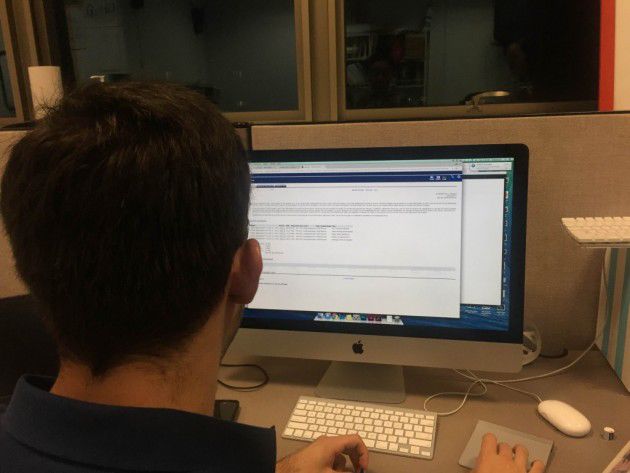Student athletes given priority registration times for spring semester
November 8, 2016
A new pilot program allowing varsity athletes to have priority class registration times will be effective for the upcoming spring semester. Each athlete will be able to register for classes on the morning of their normally assigned registration day, several hours before non-athletes register.
“We are running a test of a program for this upcoming registration that will be closely monitored by a group of faculty, students and staff to see its impact on students as well as the student athletes so we can evaluate its effectiveness and correct any issues before moving forward with making any decisions about future registration,” Randy Weinstein, Associate Vice Provost for Teaching and Learning, said in an email.
According to Weinstein, the program is meant to address athletes’ difficulty scheduling required courses that do not conflict with practice and competition schedules, maintaining a major or pursuing a minor in a program with limited availability, and the extensive work after registration to resolve scheduling issues.
“We have to try and see if it helps solve the problem which included massive amounts of man hours to get the athletes that would not meet eligibility requirements towards graduation into classes,” Weinstein said. “We are the only Big East team that does not already have a program like this implemented. We also looked at the top 50 universities, now that we’re ranked and almost half of them have it as well.”
Provost Patrick Maggitti asked a temporary task force to look into the issue, review the circumstances and make recommendations after the Faculty Congress expressed concern that there had not been sufficient input from students and faculty. The task force, comprised of seven faculty members, recommended a new version to the initial plan. According to a professor of sociology, who serves as treasurer for the Faculty Congress and chairperson of the Athletic Advisory Committee, it was suggested that priority registration only be granted to in-season athletes with Junior standing and no more than 30 percent of any single class could be comprised of varsity athletes. It was also recommended that the program be tested before it was fully implemented.
“The task force was looking for something smaller that was more easily assessed, to see how it worked or didn’t work, if it accomplished whatever goals they had for it or if it caused more problems,” the professor said.
“The Academic Policy Committee members raised three concerns every time the issue arose,” Robert Styer, a Professor in the Department of Mathematics and Statistics and a former member of the Academic Policy Committee, wrote in an email. “The first is that other students have as strong or stronger cases for early registration. Why should athletes have priority over other equally deserving students? The second is that any system encouraging athletes to become the majority of a course opens up opportunities for grade abuses and limits the diversity of student viewpoints in a discussion course.”
Styer is also the former chair of the University Senate and a former member of the Faculty Congress Executive Committee.
“The third is the Committee discussed several less radical ways to assist athletes with registration that do not give every athlete, regardless of their practice schedule, carte blanche over all other students,” Styer wrote.
“People have thrown out that engineers have really tight schedules, nurses have really tight schedules,” Weinstein said. “It’s not off the table but the NCAA, if you’ve ever read their rule book, it’s huge about what you have to do to maintain their standards. It’s the only group on campus that’s looked at to that level of detail and rigor.”
Weinstein said that any athlete found in violation of the University’s rules, especially regarding the holding of courses for other students, will lose the privilege of registering early. Sixteen sections of different courses, identified as historically popular amongst athletes, according to Weinstein, have been capped. Members of the University’s cheerleading team are the only students excluded from this privilege.
As of last year, several committees including faculty and staff members and the Student Government Association, looked into the issue. SGA also conducted a survey during the past spring semester and received 600 responses, which were discussed by the SGA Athletics Advisory Committee.
“This policy change helps ensure that student athletes are able to accommodate their practice schedule with academic requirements so they can graduate on time,” current SGA President Bobby Roenitz said. “However, it is important that we fully investigate and understand the ways this change will affect non-athlete students.”
“I am involved in other outside clubs and organizations that would have potential to interfere with a class schedule,” one non-athlete student who preferred to remain anonymous said. “We all balance a lot of activities every week, and just because they are athletes does not mean they get special treatment. I think it is an athlete’s choice to be involved in an athletic program and they should realize the advantages and disadvantages that come along with that. I think they can be accommodated in a way that does not give them an unfair advantage over anyone else.”
“I think I’ve struggled every semester registering for classes, but there’s always a way around it,” another non-athlete student said. “I have a roommate who is an athlete and got to register early, which always seems unfair but they need to schedule classes around their workout and practice schedules. It’s understandable but not always fair.”
“I had a pretty painless registration,” a non-athlete who had just completed the registration process said. “I haven’t heard of any real problems.”
Several athletes declined to comment on the topic, and The Villanovan was unable to obtain a comment from the University Athletic Director or any representative of the Athletics Department.











